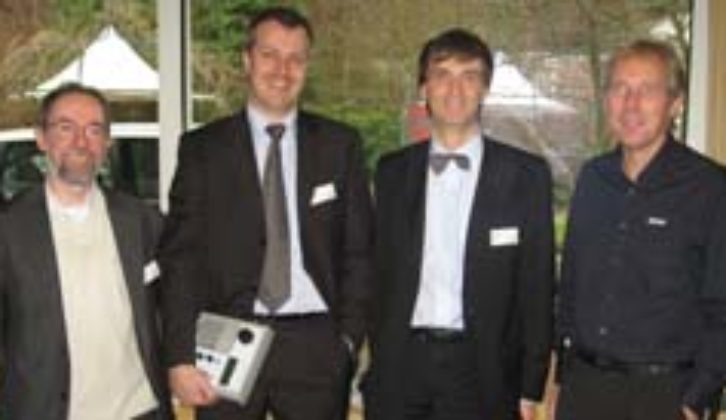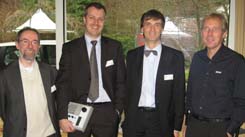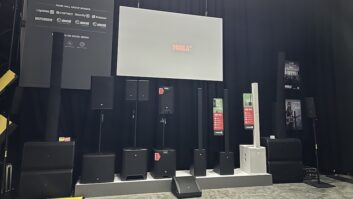

From left: Thomas Krey of Orban CRL; Richard Ham, YouCom representative for Tieline Technology; Gerald List of AETA Audio; and Joerg Rimkus of Mayah Communications
Codec manufacturer Tieline Technology, based in Perth, Western Australia, has joined the Audio-via-IP Experts Group in an advisory role on the interoperability of audio codecs when broadcasting over IP. Tieline joined other Group members Orban CRL, Mayah Communications and AETA, and will collaborate on interoperability when developing new audio-over-IP enhancements.
“This is a terrific step forward for broadcasters,” says Darren Levy, Tieline’s international marketing manager. “This move reinforces our belief that codec manufacturers need to collaborate to make it easier for broadcasters to evolve from existing circuit-switched infrastructure into new audio-over-IP technologies.”
Tieline is a leading manufacturer of broadcast quality audio codecs and has focused on helping broadcasters transition from circuit switched POTS, X.21 and ISDN technologies into packet-switched IP technologies. “As broadcasters are now being forced to migrate to IP networks, they are looking to the EBU [European Broadcast Union] and manufacturers to establish a global standard for reliable broadcasting over IP networks,” Levy says. “This includes interoperability between brands over these new networks.”
With the proliferation of high-speed LAN connections and high-speed 3G networks around the globe, demand for flexible and reliable IP codecs is growing exponentially. “Since 2005, Tieline has been shipping IP solutions over wired and wireless networks,” says Tieline research and development manager PJ Fall. “In 2007, the EBU released specifications for IP compatibility, and Tieline has complied with these and successfully tested our codecs with a number of European codec manufacturers—including our interoperability over IP using SIP.”
The company says that implementation of SIP makes it simple for broadcasters to connect over IP without having to acquire dedicated IP addresses. Codecs and other SIP-registered devices can simply dial another SIP-registered device and connect, similar to making regular phone calls. Tieline codecs can make direct peer-to-peer calls using SIP or dial through a SIP server, which connects to other devices that are registered to SIP servers. Tieline further states that SIP technology is increasingly pervasive in a multitude of IP products, and its natural integration into the IP world will continue because of its ability to evolve, and its flexibility in connecting to any SIP-compatible device. SIP is the protocol supported by most telcos for VoIP interoperability.
“IP and SIP technologies are the future of broadcasting, and more and more we are seeing broadcasters embrace them,” Levy says. “IP proliferation is still in its infancy, but broadcasters are seeing the cost advantages over ISDN and the flexibility that the technology provides, particularly in the wireless arena.”
For more information, visit www.audio-via-ip.com and www.tieline.com.


